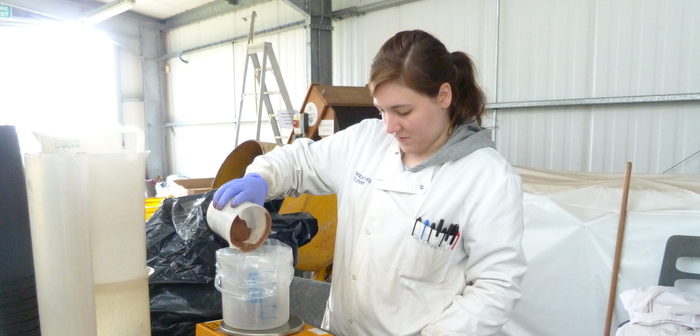Modern agriculture is a highly advanced technological industry being driven by scientific discoveries – and women are increasingly leading these innovations to enhance British farming.
According to the Office for National Statistics (ONS) Labour Force Survey, women now make up one third of the agricultural sector’s traditionally male-dominated workforce, having increased by 7% over the last decade.
In occasion of International Women’s Day, the Agriculture and Horticulture Development Board (AHDB) is shining a spotlight on some of the women driving British agriculture to new frontiers.
AHDB sponsors PhD studies to support specialist technical training for scientists. This year, the Levy Board has committed a further £5 million in research and development funding for PhD students over the next five years, with R&D identified as the main source of long-term agricultural productivity growth by the Organisation for Economic Co-operation and Development (OECD).
Of the current cohort of PhD students, 60% are female.
Projects currently being undertaken by female scientists include microchipping slugs in order to monitor the mechanisms behind their patch formations, which will enable farmers to carefully target and reduce the use of pesticides on crops.
Inoculating carrots
At Warwick University, PhD student Kathryn Hales is investigating solutions to combat cavity spot, one of the major diseases to plague carrots, which causes millions of pounds of damage in the UK each year.
“This disease is mainly caused by an oomycete called Pythium violae, which attacks the mature carrot root causing small, black sunken lesions, which makes the carrots unmarketable,” Kathryn says.
“There is only one fungicide available for use against cavity spot, but growers are reporting that this is now working less than 50% of the time. And, given current issues surrounding getting new products registered for use, this one line of defence raises concern for the future sustainability of the industry.”
Kathryn is using DNA-based methods to establish a more reliable way of identifying and tracking the pathogen in the soil over time. Her work involves developing an inoculation system to artificially induce cavity spot disease to allow for testing of new control products.
Cow comfort
Animal wellbeing is another critical focus area for the agricultural industry.
In Nottingham, Katie Fitzgerald, a vet doing a Masters degree by research, spends her days interpreting information on dairy cow behaviour provided by innovative sensor monitoring technologies to improve the comfort and welfare of cows. Her work is part of a research partnership between AHDB Dairy and the University of Nottingham.
“The biggest reward for me is having the opportunity to think about how my research can have a positive impact on the dairy industry by improving the welfare of cows and improving the efficiency of the farming businesses,” she says.
“Agricultural research gives me a unique opportunity to undertake good science with a genuine practical application in an industry I am incredibly passionate about.”
Pregnancy test for vegetable crops
The science behind the home-pregnancy test is now being trialed to detect the presence of diseases which can devastate fields of vegetable crops – including onions, broccoli and the Christmas sprout – which generated more than £356 million for UK agriculture in 2016.
Working in partnership with growers, Warwickshire College and Mologic, AHDB Senior Scientist Cathryn Lambourne is using the same testing equipment, known as a lateral flow device (LFD), to identify diseases including downy mildew, light leaf spot and ring spot, which can lead to a 30% loss of crop if left untreated.
Used alongside weather data, these ‘pregnancy’ test results indicate how likely a disease is to develop, allowing growers to decide if crop protection methods are required. The method also enables farmers to take immediate action, without the need for crop samples to be sent away to laboratories for further testing.
Cathryn said: “When it’s fully developed, this simple low-cost tool allowing growers to test whether there’s a risk of diseases developing on their crops will help prevent significant financial losses and reduce the need to use conventional methods to protect their crops.
“Over the last four years, we’ve been developing the lateral flow device test, demonstrating how simple and effective it is, to give growers the confidence to rely on the results and make appropriate decisions for their business.”
Leading the way
AHDB resource management scientist for soil, Dr Amanda Bennett, said: “It’s important we recognise the leading role women are now playing to advance scientific research within the UK’s agricultural sector.
“The increasing number of women pursuing PhD studies within the field is also incredibly encouraging for the future of the industry and it is vital to invest in this talent.”




